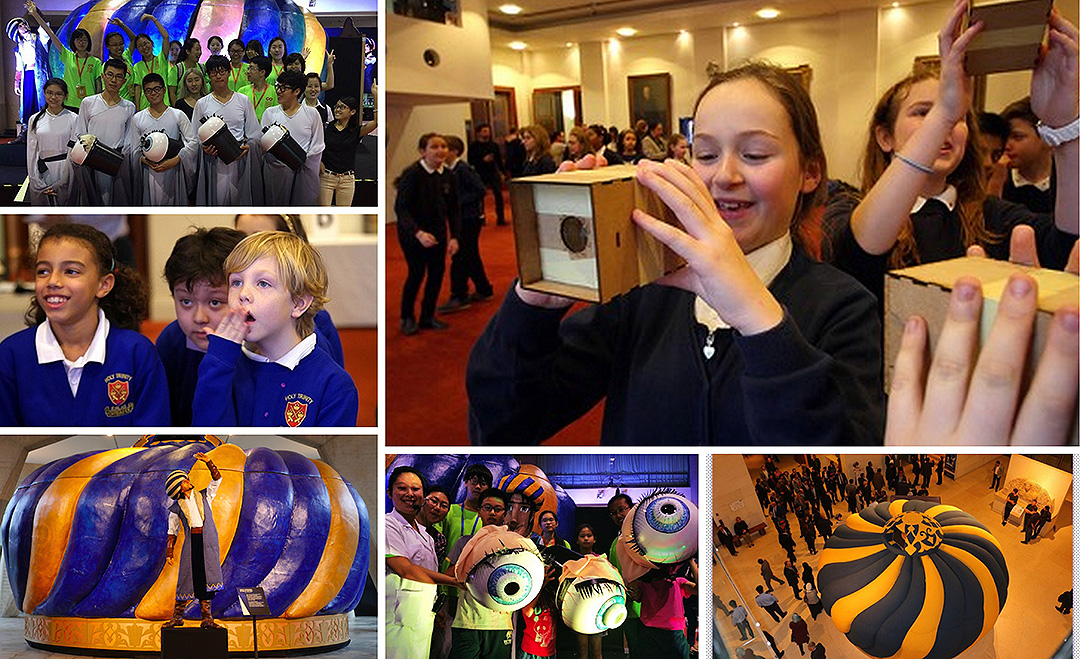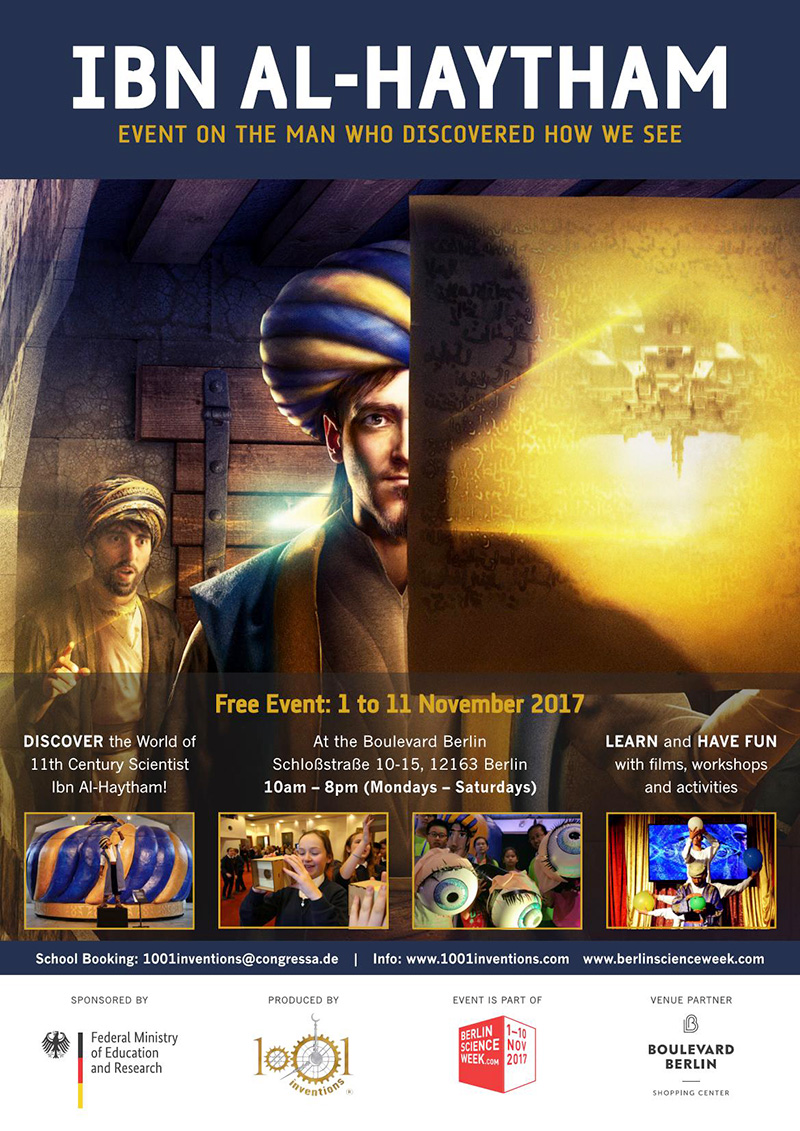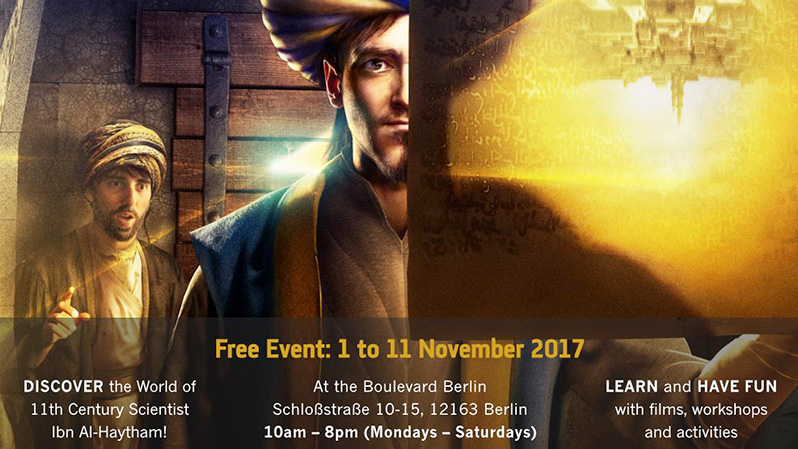1001 Inventions Presents Ibn Al-Haytham Show For The First Time In Germany
1001 Inventions is organising “Ibn Al Haytham: The Man Who Discovered How We See” educational experience for the first time in Germany as an anchor event of the Berlin Science Week.
The event to be held at the Boulevard Berlin shopping centre from 1-11 November 2017 will present the extraordinary work of Ibn al-Haytham, the 11th century pioneering scientific thinker from Arabia, who made remarkable contributions to the understanding of light, optics and vision.
Inspired by Ibn al-Haytham, the educational and cultural event targeting children aged 7 to 14 years will include activities that help simplify theories on how we see. Children will join a wondrous journey to fascinating ancient times through the eyes of Ibn al-Haytham. Visitors will be introduced to principles of light and vision as they walk into a giant turban-shaped camera obscura, engage in fun science demonstrations and watch an exciting short film starring late legendary actor Omar Sharif.
The event is sponsored by the Federal Ministry of Education and Research (BMBF).

Prof. Dr. Jürgen Mlynek, Coordinator of the Berlin Science Week explained:
 We believe that the Ibn Al-Haytham show is a fantastic opportunity to communicate science to a broader and younger public and we are grateful that 1001 Inventions chose the Berlin Science Week and the city of Berlin as a platform for their first event in Germany.
We believe that the Ibn Al-Haytham show is a fantastic opportunity to communicate science to a broader and younger public and we are grateful that 1001 Inventions chose the Berlin Science Week and the city of Berlin as a platform for their first event in Germany.
Ahmed Salim, Co-Founder and Director of 1001 Inventions said:
 Our Ibn Al-Haytham events have achieved resounding success in many cities around the world since launched at UNESCO headquarters in 2015. We are delighted to bring this educational experience to Germany, for the first time, as part of the Berlin Science Week 2017 with the support of the Federal Ministry of Education and Research. We aspire to help spark children’s interest in science and passion for learning while supporting integration and promoting intercultural appreciation.
Our Ibn Al-Haytham events have achieved resounding success in many cities around the world since launched at UNESCO headquarters in 2015. We are delighted to bring this educational experience to Germany, for the first time, as part of the Berlin Science Week 2017 with the support of the Federal Ministry of Education and Research. We aspire to help spark children’s interest in science and passion for learning while supporting integration and promoting intercultural appreciation.
Prof. Dr. Siegfried Zielinski, Rector Karlsruhe University of Arts & Design explained:
 Ibn al-Haytham (956-approx. 1040/41), who is also referred to as Al Hazen or Alhasen in German literature, is one of the outstanding natural philosophers, mathematicians, physicists and astronomers of the Golden Age of the Arabic-Islamic knowledge cultures. He has long been discovered by the occidental history of knowledge and technology as an exceedingly brilliant and original scientific thinker who is placed by many on the same level as the Italian Galileo Galilei. He particularly excelled in the calculation of complex mathematical phenomena such as the density of the atmosphere, the light of dawn and dusk (twilight), the calculations of rainbow rays as an interaction of reflection and refraction of light in fine water droplets. One of his biographers, Ibn Abi Usaibi’a, summarised his special qualities in just one sentence: “He was constantly working; he wrote many books, was extremely abstemious, and loved the good.” As a media archaeologist, I particularly appreciate the very early experimenter who invented a number of instruments for his empirical studies which were of great significance for the history of media – the camera obscura in particular.
Ibn al-Haytham (956-approx. 1040/41), who is also referred to as Al Hazen or Alhasen in German literature, is one of the outstanding natural philosophers, mathematicians, physicists and astronomers of the Golden Age of the Arabic-Islamic knowledge cultures. He has long been discovered by the occidental history of knowledge and technology as an exceedingly brilliant and original scientific thinker who is placed by many on the same level as the Italian Galileo Galilei. He particularly excelled in the calculation of complex mathematical phenomena such as the density of the atmosphere, the light of dawn and dusk (twilight), the calculations of rainbow rays as an interaction of reflection and refraction of light in fine water droplets. One of his biographers, Ibn Abi Usaibi’a, summarised his special qualities in just one sentence: “He was constantly working; he wrote many books, was extremely abstemious, and loved the good.” As a media archaeologist, I particularly appreciate the very early experimenter who invented a number of instruments for his empirical studies which were of great significance for the history of media – the camera obscura in particular.
Hanan Dowidar, 1001 Inventions Head of Strategic Partnerships said:
 We are delighted to organise the Ibn Al-Haytham educational event in Germany with the support of BMBF and the Falling Walls Foundation. Ibn al-Haytham made important contributions to science and his fascinating story serves as an inspiration to young people all over the world.
We are delighted to organise the Ibn Al-Haytham educational event in Germany with the support of BMBF and the Falling Walls Foundation. Ibn al-Haytham made important contributions to science and his fascinating story serves as an inspiration to young people all over the world.
The Ibn Al-Haytham event is part of a global educational initiative launched in partnership with UNESCO to celebrate the United Nations proclaimed International Year of Light. 1001 Inventions led tribute events for Ibn al-Haytham at the UNESCO headquarters in Paris, New York Academy of Sciences and the United Nations in New York, the China Science Festival in Beijing, the Royal Society in London, the Jordan Museum in Amman and in many other cities around the world.

Eye-Scura – Based on Justin Quinnell’s camera obscura design
EVENT IS FREE OF CHARGE
Dates and Location
Ibn Al-Haytham: The Man Who Discovered How We See
1 to 11 November 2017
Mondays to Saturdays from 10am to 8pm
Boulevard Berlin Shopping Centre (Schlossstraße 10-15, 12163 Berlin)
School and Group reservations: 1001inventions@congressa.de

About Berlin Science Week
The Berlin Science Week is a new international gathering, bringing together people from the world’s most innovative scientific institutions in Berlin. It is dedicated to the dialogue between science and society to inspire a deeper understanding of our world. The Berlin Science Week fosters interdisciplinary exchange and encourages fellow participants to connect and learn from each other.
The Berlin Science Week is kindly supported by the Governing Mayor of Berlin, Senate Chancellery – Higher Education and Research and coordinated by the Falling Walls Foundation.
About 1001 Inventions
1001 Inventions is an award-winning, British based organization that creates international educational campaigns and engaging transmedia productions aiming to raise awareness of the contributions to science, technology and culture from the Golden Age of Muslim Civilisation.
1001 Inventions has engaged with over 400 million people across the globe working with a network of international partners, including UNESCO, National Geographic and leading academics to produce interactive exhibits, short films, live shows, books and classroom learning materials that are being used by hundreds of thousands of educators around the world.
www.1001inventions.com
www.Ibnalhaytham.com



